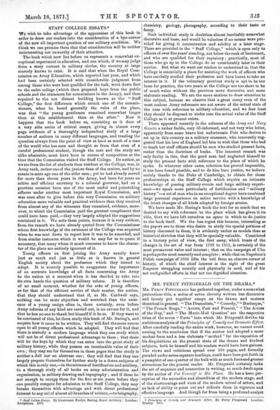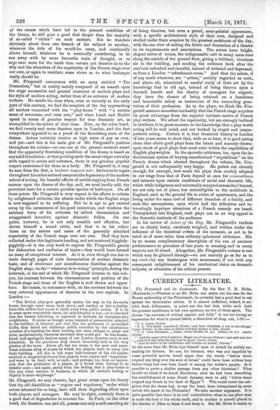MR. PERCY FITZGERALD ON THE DRAMA.* MR. PERCY FITZGERALD has
gathered together, under a somewhat pretentious title, a series of seven cleverly written but discursive and loosely put together essays on the drama and matters theatrical in general. "The Dramatists,"" Comedy," 6 6 Burlesque," "The French Stage," "Actors, Past and Present," "The Actors of the Day," and "The Music-Hall Question" are the respective titles of the seven " Parts" into which Mr. Fitzgerald divides his ambitious analysis of the Principles of Comedy and Dramatic Effect. After carefully reading the entire work, however, we cannot avoid coming to the conclusion that if the author had adopted a more modest form and a less elaborate " mothod "for the exposition of his disquisitions on the present state of the drama and kindred subjects, both he himself and his readers would have been gainers. The views and criticisms spread over 368 pages, and formally paraded under seven separate headings, could have been put forth in a pamphlet of one-quarter of the bulk with as much forceand greater attractions for the general reader. Mr. Fitzgerald certainly lacks the art of sequence and connection in writing, so much dwelt upon by the author of Put Yourself in His Place. He has a keen per- ception of the anomalies and absurdities of the modern stage, and of the shortcomings and vices of the modern school of actors, and no lack of ability to point out and ridicule them in vigorous and effective language. And though far from being a profound analyst
• Principles of Comedy awl Dramatic Effect By Percy Fitzgerald London: Tinsley. 1870.
of the causes which have led to the present condition of the drama, be still goes a good deal deeper than the majority of so-called " critics " on such matters. But he sanders deviously about from one branch of his subject to another, whatever the title of his would-be essay, and continually allows himself, whatever he is nominally considering, to be run away with by some favourite train of thought, or to urge once more for the tenth time certain pet theories as to the why and the wherefore of the superiority of the French stage over our own, or again to ventilate some views as to what burlesque really should be.
Mr. Fitzgerald commences with an essay entitled "The Dramatists," but in reality mainly composed of an assault upon the stage accessories and general character of modern plays and the style of modern acting, rather than of an estimate of modern authors. He recalls the time when, even as recently as the early
part of this century, we find the essayists of the day approaching all matters connected with the " play-house " with "a certain sense of reverence, and even awe," and when Lamb and Hazlitt speak in terms of genuine respect for true dramatic art, as exemplified in the actors of their time. Now, on the other hand, we find twenty and more theatres open in London, and the fact everywhere appealed to as a proof of the flourishing state of the drama. Actors certainly receive as high rates of pay as ever, and yet—and this is the main gist of Mr. Fitzgerald's position throughout his volume—no one can at the present moment assert that the apparently flourishing condition of the drama is based on anysolid foundation; or that putting aside the usual vulgar curiosity with regard to actors and actresses, there is any genuine popular respect entertained for them as a body. Mr. Fitzgerald is, it may be seen from the first, a laudator temporis acti ; his favourite topics throughout his entire series of essays are the degeneracy of the modern school of acting, the baneful effects of servile copying from French sources upon the drama of the day, and, we need hardly add, the prevalent taste for a certain peculiar species of burlesque. On all these points Mr. Fitzgerald is very urgent in his efforts to reform by enlightened criticism the abuses under which the English stage is now supposed to be suffering. But he is apt to get carried away by the earnestness of his good intentions, and weakens the salutary force of his criticism by stilted denunciation and exaggerated invective against dramatic follies. On one point, however, he is not only sensible and effective, but shows himself a sound critic, and that is in his reflec- tions on the nature and cause of the generally admitted superiority of the French stage over our own. Had they been collected under this legitimate heading, and not scattered higgledy- piggledy—it is the only word to express Mr. Fitzgerald's genius for dislocation and confusion of topics—they would have formed an essay of exceptional interest. As it is, even though one has to wade through pages of stale denunciation of modern dramatic taste, and of irrelevant and miscellaneous diatribes against the English stage, on the" whatever-is-is-wrong" principle, during the intervals, at the end of which Mr. Fitzgerald returns to this sub- ject, his contrast between the circumstances and position of the French stage and those of the English is well drawn and oppor- tune. He insists, to commence with, on the contrast between the very external appearances of theatres in the two capitals. In London
The British play-goer generally makes his way to his favourite house through some mean back street, and reaches at last a shabby, barn-like edifice that seems to skulk away from public notice. If it be in some more respectable street, its individuality is lost,—it is absorbed into the houses adjoining, or squeezed in between its bourgeois-like neighbours. It seems as though some remnant of persecution attached to the builders of theatres, and that, like the professors of proscribed faiths, they dared not challenge public attention by the ostentatious erection of a building for their worship, but were obliged to adapt and alter, unobtrusively, whatever structure they could get. In this shame- faced, half-apologetic fashion many of our London theatres seem to ask toleration. In the provinces they almost invariably lurk in the very ghettos of the town. Above all, but too mean, is the poor and some- times noisome alley of access by which the players have to creep into their building. All this is but some half-remnant of the old squire- archical or magisterial theory that players were rogues and vagabones,' and were to be dealt with as such; and perhaps too, from an impres- sion that the profession of a player, in a broad view, belongs to an inferior caste ; and again, partly from the feeling that a play-house is like any other venture in business, in which all assthetie feeling or dignity is mere surplusage."
Mr. Fitzgerald, we may observe, lays great stress upon his theory that the old disabilities as "rogues and vagabones," under which actors laboured for so long, have still their degrading effect upon both players and managers. He may be right, certainly there is a good deal of degradation to account for. In Paris, on the other hand, the theatres, one and all, possess not only a self-asserting air
of being theatres, but even a proud, semi-palatial appearance, with a specific architectural style of their own, designed and studied under State auspices by the greatest architects of the day, with the one view of suiting the fabric and decoration of a theatre to its requirements and associations. The actors have bright, elegant suites of rooms, the indispensable cafe in many cases runs along the outside of the ground floor, giving a brilliant, vivacious air to the building, and sending the audience back after the entr'acte refreshed and cheerful, instead of irritated and depressed, as from a. London "refreshment-room." And then the actors, if of any merit whatever, are "artists," socially regarded as such, and above all, stimulated to careful study of their art by the knowledge that in old age, instead of being thrown upon a farewell benefit and the charity of managers for support, they have the chance of being retained on a handsome and honourable salary as instructors of the succeeding gene- ration of their profession. As to the plays, we think Mr. Fitz- gerald assumes somewhat too hastily that the French stage acquires its great advantage from the superior intrinsic merits of French play-writers. We admit the superiority, but are strongly inclined to attribute it in great measure to the knowledge that a play worth acting will be well acted, and not barked by stupid and unsym- pathetic acting. Certain it is that theatrical history in London of late years seems to show that, with US at least, it is good acting alone that elicits good plays from the latent and scarcely-drawn- upon stock of good plays that must exist within the capabilities of English playwrights. In the sporadic criticisms, too, upon the in- discriminate system of levying unauthorized " requisitions " on the French drama which abound throughout the volume, Mr. Fitz- gerald is not unfrequently very happy. He points out cleverly enough, for example, how much the plays thus crudely adapted to our stage from that of Paris depend at once for vraisemblance and interest upon certain conditions of social and domestic life, which while indigenous and universally accepted across the Channel, are not only out of place, but unintelligible to the multitude in England, such as the general life in suites of apartments, and the living under the same roof of different branches of a family, and such-like assumptions, upon which half the ridiculous and in- terestingly improper situations of a French comedy are based. Transplanted into England, such plays can in no way appeal to the domestic instincts of the audience.
In his review of Actors of the Day, Mr. Fitzgerald's verdicta are so clearly hasty, carelessly weighed, and written under the influence of the theatrical events of the moment, as not to be as of more value than ordinary ephemeral criticisms. His by no means complimentary description of the run of amateur performances so prevalent of late years is amusing and in many respects not ill-timed. Altogether, Mr. Fitzgerald's volume is one which may be glanced through—we can scarcely go as far as to say read—by any theatregoer with amusement, if not with any consequent enlightenment of his intellectual vision on dramatio subjects, or education of his critical powers.



































 Previous page
Previous page